语法主谓一致[上学期]
图片预览

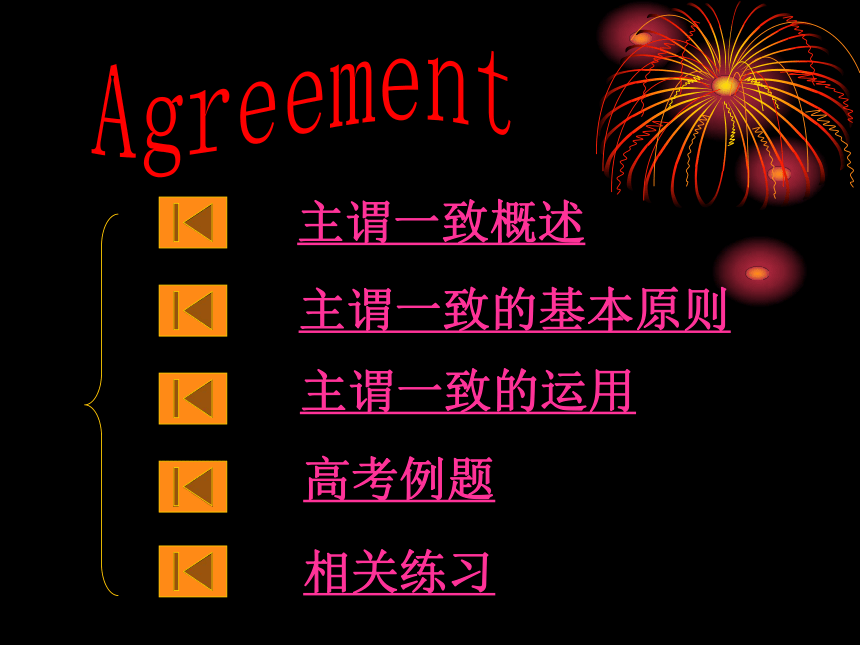
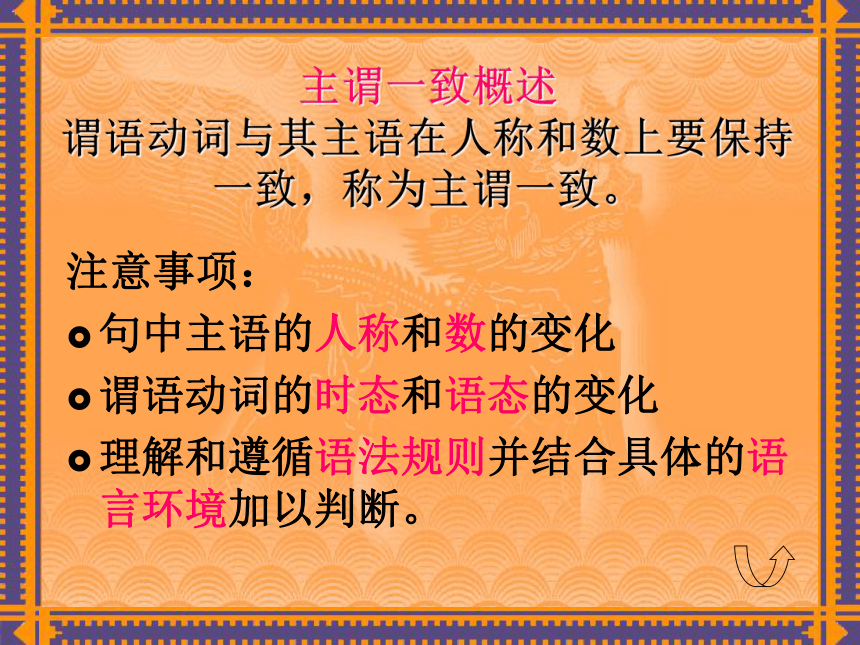
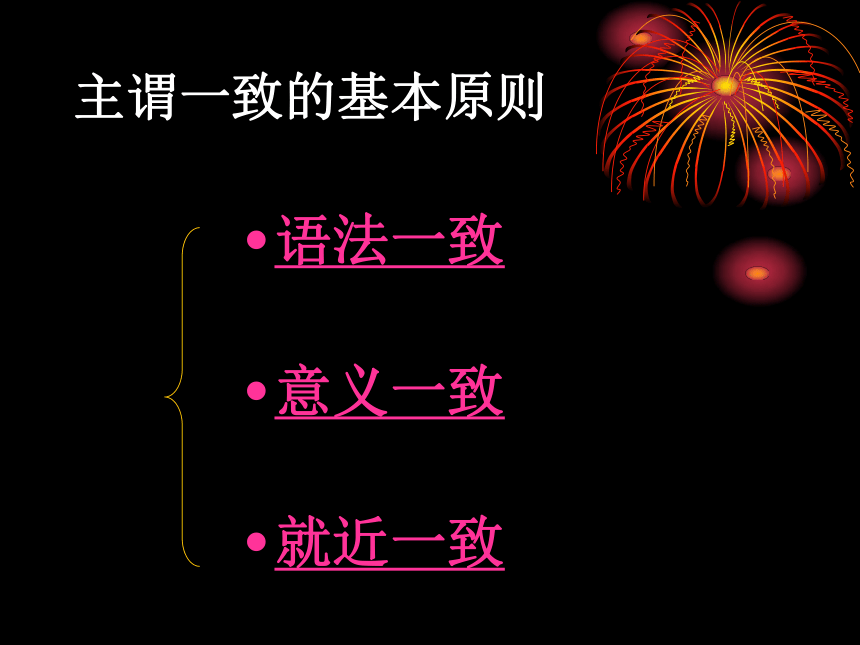
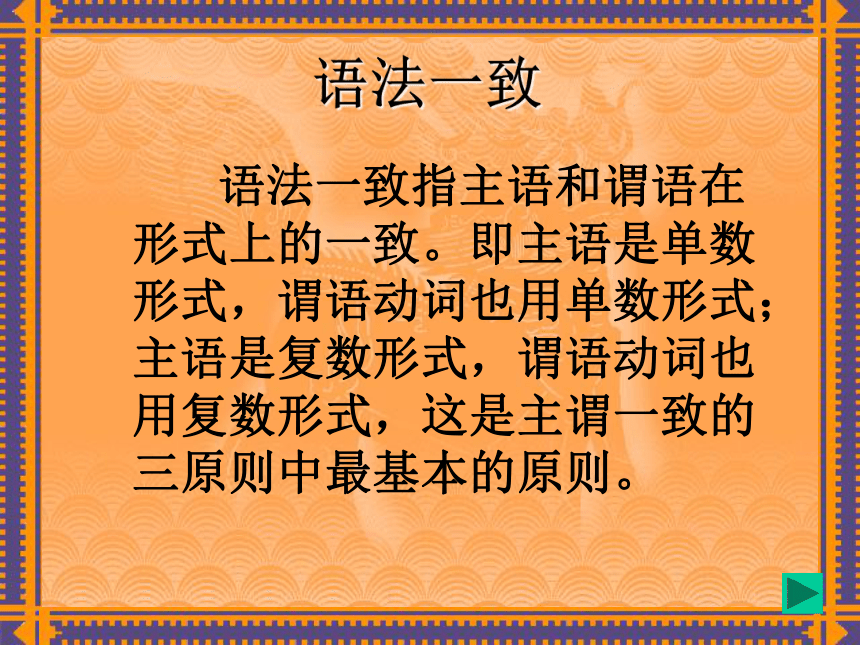
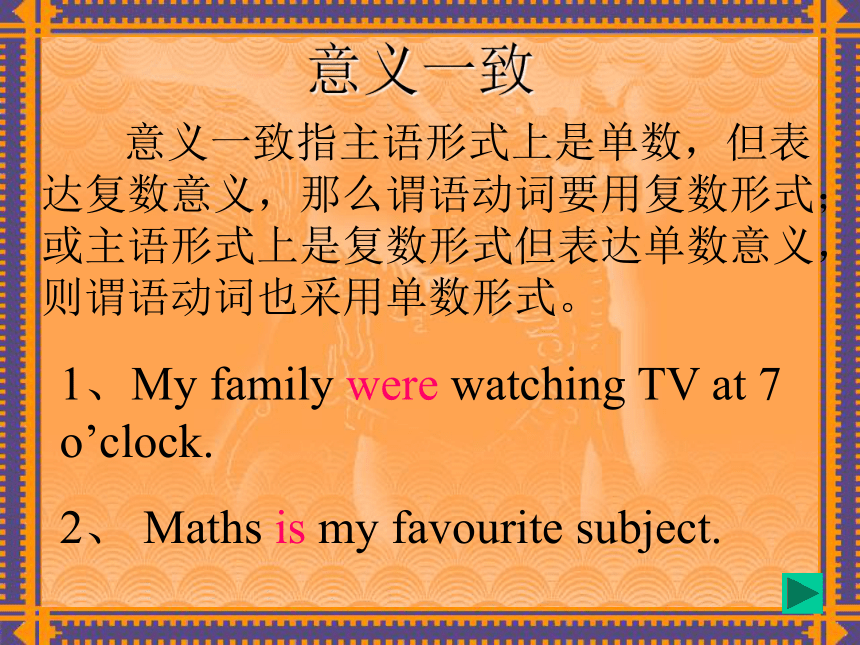
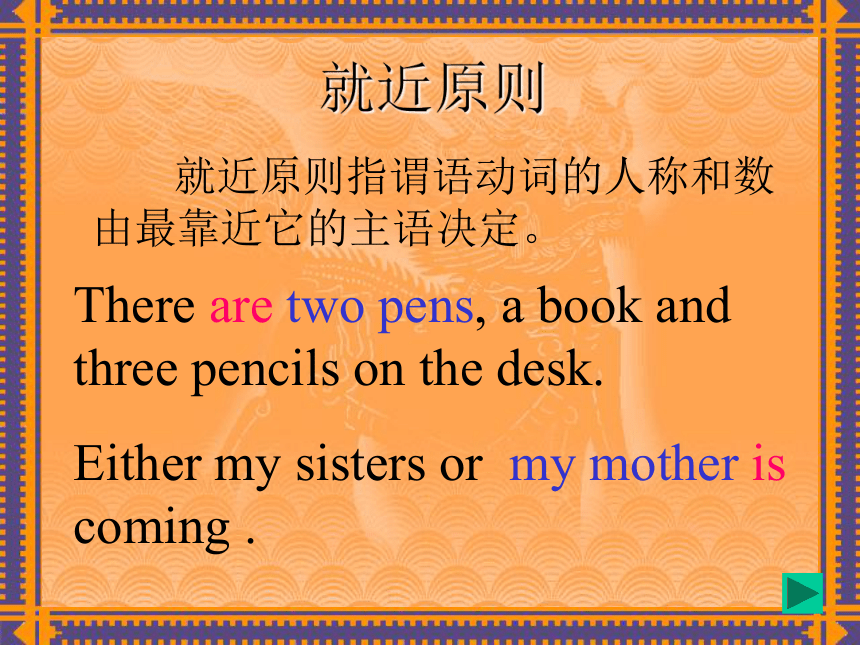
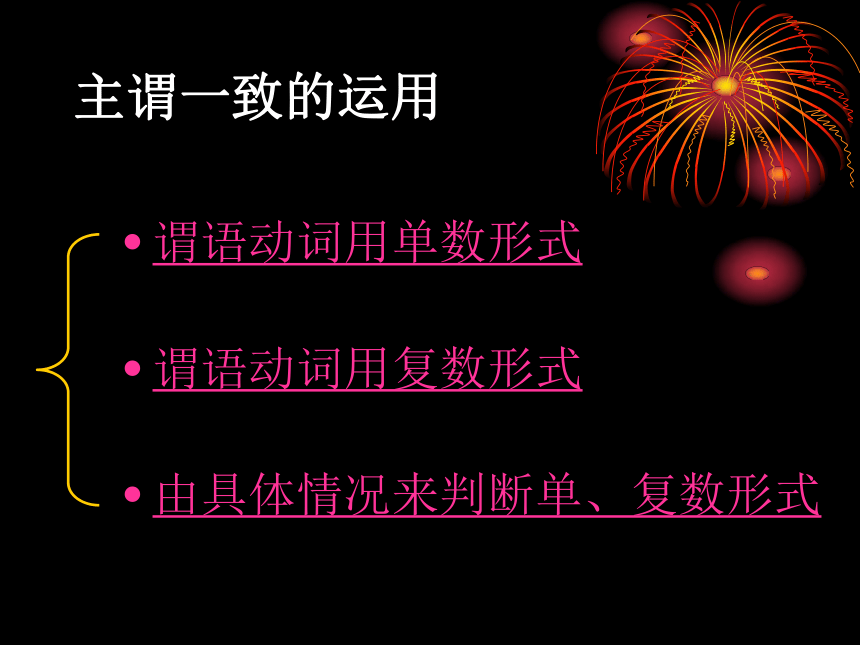
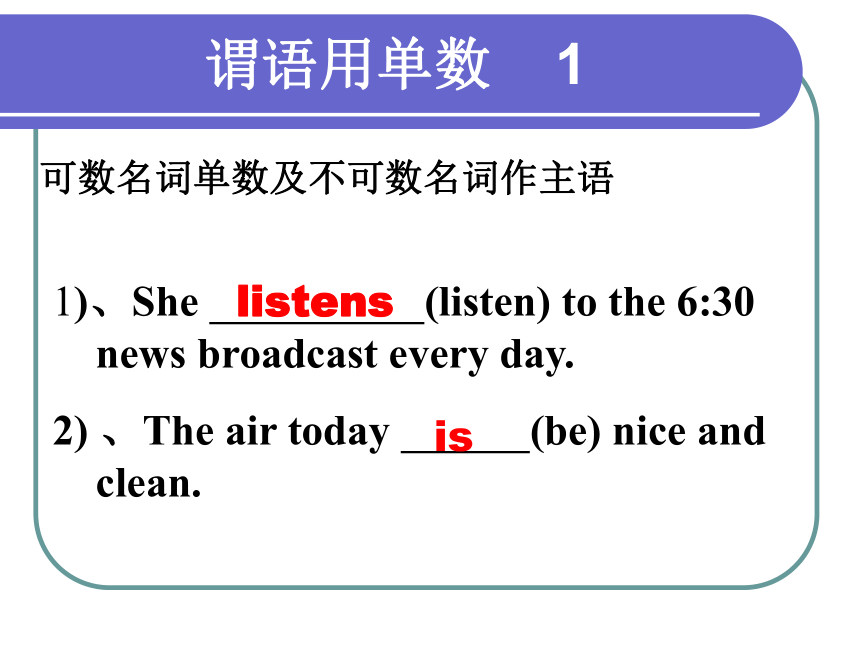
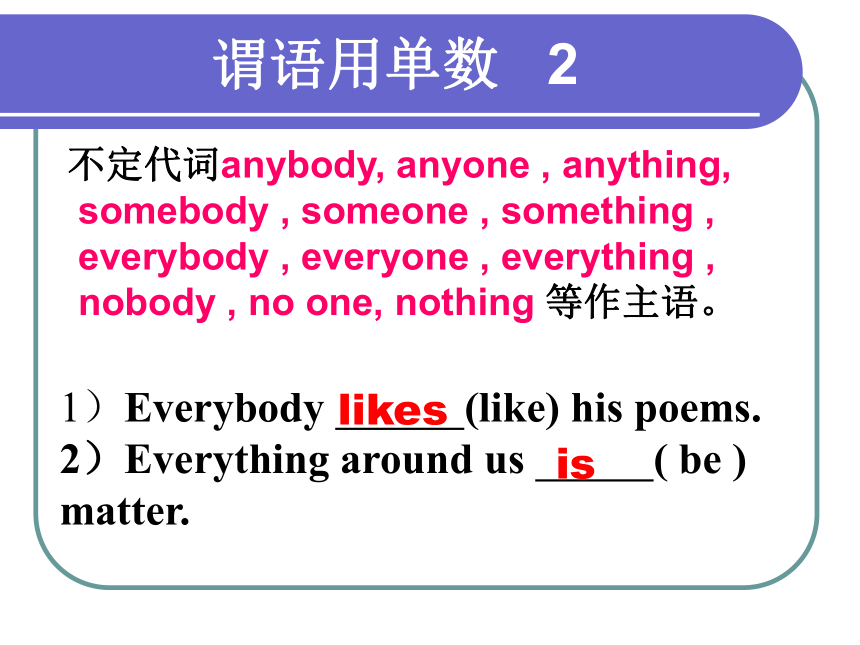
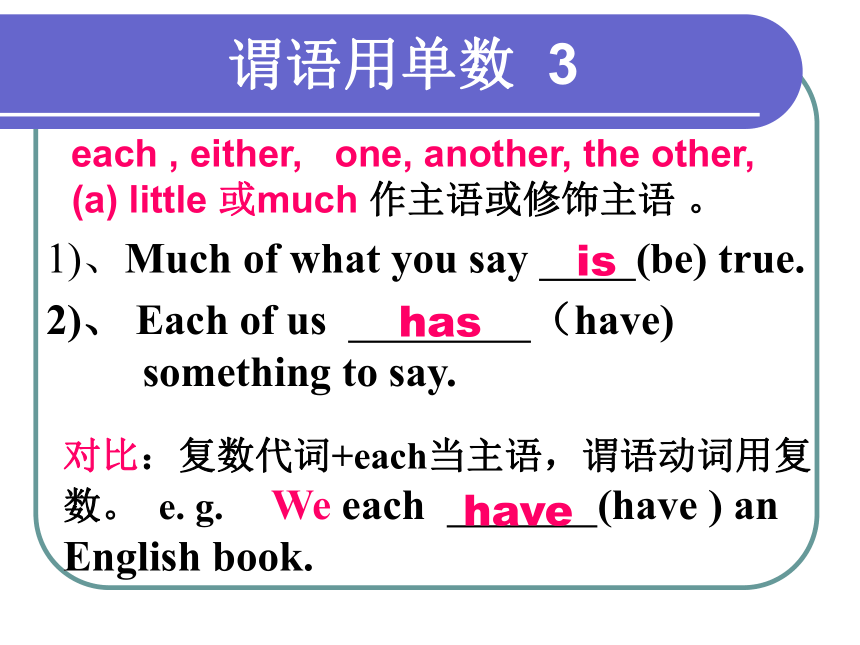
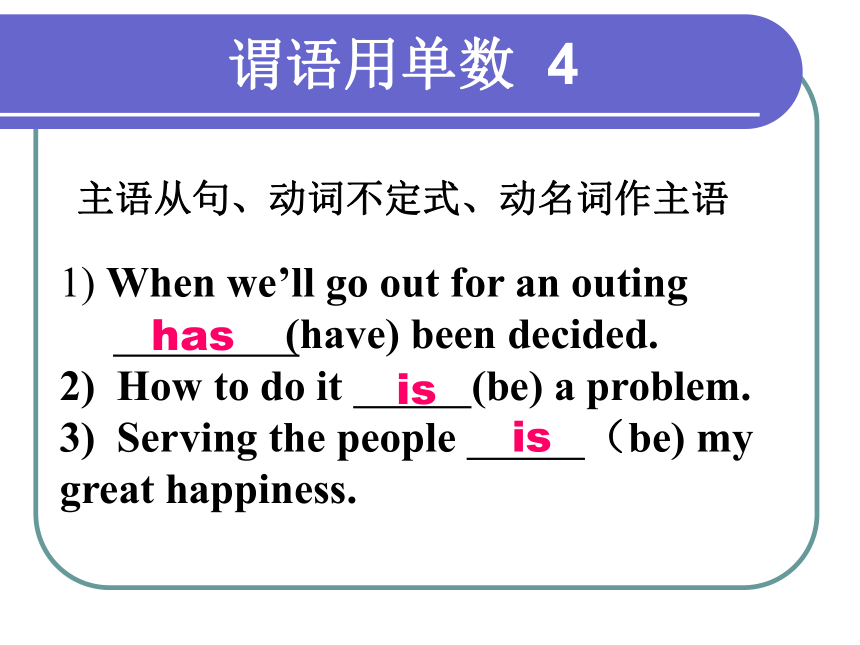
文档简介
课件54张PPT。 Grammar: Agreement
Agreement 主谓一致概述主谓一致的运用高考例题相关练习主谓一致的基本原则主谓一致概述 谓语动词与其主语在人称和数上要保持一致,称为主谓一致。注意事项:
句中主语的人称和数的变化
谓语动词的时态和语态的变化
理解和遵循语法规则并结合具体的语言环境加以判断。
主谓一致的基本原则语法一致
意义一致
就近一致语法一致 语法一致指主语和谓语在形式上的一致。即主语是单数形式,谓语动词也用单数形式;主语是复数形式,谓语动词也用复数形式,这是主谓一致的三原则中最基本的原则。意义一致 意义一致指主语形式上是单数,但表达复数意义,那么谓语动词要用复数形式;或主语形式上是复数形式但表达单数意义,则谓语动词也采用单数形式。1、My family were watching TV at 7 o’clock.
2、 Maths is my favourite subject.就近原则 就近原则指谓语动词的人称和数由最靠近它的主语决定。There are two pens, a book and three pencils on the desk.
Either my sisters or my mother is coming .主谓一致的运用谓语动词用单数形式
谓语动词用复数形式
由具体情况来判断单、复数形式谓语用单数 1 可数名词单数及不可数名词作主语
1)、She (listen) to the 6:30 news broadcast every day.
2) 、The air today (be) nice and clean.listensis谓语用单数 2 不定代词anybody, anyone , anything, somebody , someone , something , everybody , everyone , everything , nobody , no one, nothing 等作主语。
1)Everybody (like) his poems.
2)Everything around us ( be ) matter.
likesis 谓语用单数 3 each , either, one, another, the other, (a) little 或much 作主语或修饰主语 。1)、Much of what you say (be) true.
2)、 Each of us (have) something to say.
has is对比:复数代词+each当主语,谓语动词用复数。 e. g. We each (have ) an English book.
have 谓语用单数 4 主语从句、动词不定式、动名词作主语1) When we’ll go out for an outing
(have) been decided.
2) How to do it (be) a problem.
3) Serving the people (be) my great happiness. has is is 注意:两个或两个以上的主语从句、动词不定式、动名词作主语,表示 多个概念或意义时,谓语动词用复数形式。但属于同一概念,也用单数。 1) What he says and what he does (do) not agree. 2)Early to go to bed and early to rise (make) a man healthy and wise.do makes对比范例谓语用单数 5 形复意单名词如: news; works(工厂)
学科名称如: physics ; maths,
economics; politics 国名如: the United States
the United Nations 报纸名如: the New Times 书名如: Arabian Nights
1)、Arabian Nights (be) full of interesting stories.
is 对比范例
如果在表科目的名词前有my, the,such 等限定词修饰表示成绩等时,可看作复数。
e.g. My maths are / is weak.
注意:英语中还有一些以-s结尾的名词,如:
arms(武器) clothes(衣服)
fireworks(烟火) goods(货物) remains(遗体) stairs(楼梯) thanks(谢意) wages(工资) works(作品) The Olympic Games等通常作复数。
对比谓语用单数 66、“a / an +单数名词+ or two” 作主语,
谓语用单数。 对比:
“one or two+复数”作主语,谓语用复数。
A day or two (have) passed.
One or two days (have) passed. has have谓语用单数 7、8is8、“one and a half +复数名词 ” 当主语。 1) One and a half bananas (be) left on the table. 7、“many a +单数名词” 作主语
Many a way (have) been tried.
has 谓语用单数 9 如果and连接的两个词前只有一个限定词,是指同一个人、同一事物或同一概念,谓语动词用单数。这类词常见的有:
war and peace iron and steel
a knife and fork a watch and chain
1) 、The poet and writer (be) her friend.
2)、Bread and butter (be) their daily
food.isis对比在each… and each, every …and every , no …and no, many a… and many a 等由and连接并列单数主语的结构中1) Each boy and each girl (have) got a seat.
2) No sound and no voice ( be) heard for a long while.
has is 谓语用单数 10谓语用复数 1 表示总称意义的名词people , police , cattle , clothes 等作主语时 。
注意:people意为“民族”时除外。1)、The British police (have) only very limited powers.
2)、 The cattle (be) eating the grass on the side of the hill. haveare 谓语用复数 2 表示成双成套的名词如shoes, trousers, gloves, glasses, scissors, compasses等当主语,谓语用复数。但若这类名词与a pair 连用时,谓语用单数。1)、His trousers (be) of good quality.
2)、This pair of trousers (be) made in Beijing.
= Trousers of this pair (be) made in Beijing.
areisare谓语用复数 3 由and 或both...and 连接两个人或物当主语,谓语动词用复数。 用and 连接时要注意前后两个名词前都要加冠词。1)、Both coffee and beer (be)
on sale in the shop.
2 ) A hammer and a saw (be)
useful tools.
areare对比谓语用复数 4 、54、one or two+复数名词”作主语 。
1)One or two students (be) planting trees yesterday afternoon. were 5、“more +复数名词+than one”作主语。
1)More members than one (have) protested against the proposal.
More than one +单数作主语,谓语用单数。have对比谓语用复数 6、76、表示群岛、山脉、瀑布等以-s结尾的专有名词当主语,谓语用复数。
The Philippines (lie) in the South Pacific.7、表示店铺名词的’s所有格作句子主语时,谓语动词用复数。
Pick Ford’s (have) imported a wide range of Chinese cotton prints.liehave对比谓语用复数 8、98、表示年代的数词复数形式作主语。
The 1950’s (be) a decade when international barriers to trade were progressively reduced.were9、不可数名词被表示数量的复数名词修饰时,谓语常用复数。 Three million tons of coal (be) exported that year.were由具体情况来判断单、复数 1 两个形容词共同修饰一个名词,若两个形容词前都带有冠词,作主语时,谓语动词用复数。两个形容词前只有一个冠词,表示一个人或物,作主语时,谓语用单数。 1、The red and the white coats (be) mine. 2、The black and white cow (be) mine. areis由具体情况来判断单、复数 2 由“ a kind of , this kind of , many kinds of + 名词和“ 名词+of this kind” 等有及由与kind 意义相似的type , sort 等构成的类似短语作主语时, 谓语动词与of 前的名词保持数的一致。
A new type of machine (be )on sale.
Machines of this new type (be) made in Wuhan.is are由具体情况来判断单复数 3 主语后面带有as well as, like, but , besides,
rather than , except , with , along with , together with , including , in addition to ,
no less than等连接的名词时,谓语动词仍视句首主语的情况而定,如果主语为单数,谓语用单数,若为复数,谓语动词也用相应的复数形式。
No one but your parents (be) there then.
was由具体情况判断单、复数 4在there be 句型中,谓语的数与并列主语中的邻近词保持一致。 1)、There (be) my wife and family to look after. 2)、There (be) two apples and a banana on the plate. isare具体情况来判断单、复数 5 连词or, either… or …, whether…or, neither…nor , not only …but also, not…but连接并列主语调时,谓语动词常与邻近的主语保持人称、数的一致。
1) Either the teacher or the students
(be) to blame.
2) (be) he or you in the classroom just now?are Was具体情况来判断单、复数 6 “more than +单数”当主语,谓语动词用单数;“more than+复数”当主语,谓语动词用复数。
1)、 More than one question
(be) asked.
2)、More than two soldiers
(be) killed in the batttle.
werewas对比 由具体情况判断单、复数 7 代词none, neither 作主语,谓语动词可用单数,也可用复数,主要根据说话人的意思决定。但在代表不可数的东西时总是看作单数,因而谓语动词要用单数。
1、None of us has / have ever been to Beijing.
2、Neither of the books is / are of any use to him.
3、 None of this worries me.
由具体情况来判断单复数 8 all, more, most , who , what , which 等代词作主语时, 根据意义,谓语动用单数或复数。 All (=All the people) (be) present.
All (=All the food) (be) delicious.
3) What they wanted (be) some
books.
4) What he needed (be) some water.areiswaswere 由‘‘all / most / some / part of , plenty of , lots of /a lot of , the rest of , the majority of +名词或代词”作主语时,谓语动词常与of后的名词或代词保持数的一致。 areis由具体情况来判断单、复数 9 1)The majority of the damage (be) easy to repair.
2) The majority of the representatives (be) for the proposal.
对比: The majority was / were against it. 由具体情况来判断单、复数3) All of the workers (be) women .
4) All of the food (be) dirty.
5) Most of the apples (be) rotten.
6) Most of the apple (be) eaten by a rat. areisisare由具体情况来判断单、复数 10 “分数或百分数+名词”作主语时,谓语动词的数与这个名词的数一致。
1) More than 70 percent of the surface of our planet (be)covered by water.
2) One-third of the students in our group (be) girls.is are 由具体情况判断单、复数 11 单、复数同形的名词作主语时,谓语动词一般随意义用相应的单、复数,常见的有sheep, deer,fish, craft(航空器)及means, species, series, works(工厂)等.
1) A gas works (have) been set up in the suburbs. 2) Many steel works (have) sprung up in our province.hashave由具体情况来判断单复数注: fish 泛指一类鱼时谓语用复数;指个别一条鱼时谓语用单数。
比较: The fish have very sharp teeth.
这种鱼牙齿锋利。
The fish has very sharp teeth.
这条鱼牙齿锋利。由具体情况来判断单复数 12 集体名词 class, team, family, group, government, population, nation, club 等作主语时,如果强调整体,谓语动词用单数;如果强调单个成员时谓语动词用复数。
1) The population of the earth (be) increasing very fast.
2) One-third of the population here
(be) from the north.areis 对比范例有些集合名词如:mankind, public, crowd, majority, enemy , audience, couple 等 作主语, 谓语动词可用单数,也可用复数。
Mankind are intelligent animals.
人类是有智力的动物。
Mankind has been making progress.
人类一直在进步。由具体情况判断单、复数 13 运算数词作主语,谓语动词可用单数也可用复数,但在表示减法或除法的句子中,谓语动词只用单数 。
1) Three times five (be ) fifteen.
2 ) Five minus four (be ) one.
3) Four divided two (equal) two.is/areisequals由具体情况来判断单、复数 14 “a quantity of , quantities of +名词” 作主语时,谓语动词的数根据quantity 的数来确定。1)There (be) a great quantity of food in the shop.
There (be) large quantities of food in the shop.is are 但 a quantity of 后接复数名词时,也有用复数的。e.g. A quantity of flowers are on sale. “ a number / variety of +复数名词“作主语时,谓语动词用复数; “ the number / variety of +名词”作主语时,谓语动词用单数。
1)A number of pages in this book
(be) broken.
2) The number of the pages in this books (be) two hundred.is are由具体情况判断单、复数 15 由具体情况来判断单、复数 16 句子主语表示“时间”,“距离”,“价格”,“度量衡”等的复数名词,作为一个整体看待时,谓语用单数。若强调个体,也可用复数。1) Another two years (pass).
2) These last three years (have)
been full of all kinds of difficulties.has passed have 由具体情况来判断单、复数 17 “the +形容词”或 “the +过去分词”作主语,表示一类人时,动词用复数;若指个人或某一类抽象概念时,动词用单数。 1)、The old (be) taken good care of here. 2)、The beautiful (give) pleasure to all.aregives由具体情况来判断单复数 18 在“one of +复数名词+who (that ,which)引导的定语从句中,从句谓语动词常用复数;若one 前有the (only) 等修饰词时,从句谓语动词常用单数。
1、She is one of the engineers who
(be) experts in German.
2、She is the only one of the engineers who (be) expert in German.
areis具体情况来判断单复数 19 主语由肯定及否定两部分构成时,谓语与肯定的一致。
1) The Smiths, not their neighbour,
(be) to blame.
2) I, not you, (be) the right person to do the work.amare1、The number of people invited ____ fifty, but a number of them ____ absent for different reasons. (C 96 NO.14)
A. were; was B. was; was
C. was; were D. were; were
2、 E-mail, as well as telephones, ____ an important part in daily communication.
(99 上海2)
A. is playing B. have played
C. are playing D. play
√√3、Nowadays, a large number of women, especially those from the countryside, in the clothing industry.
(2005,辽宁省)
A. is working B. works
C. work D. worked
4、The country life he was used to
greatly since 1992. ( 2005, 山东省)
A. change B. has changed
C. changing D. have changed
√√5、With more forests being destroyed, huge quantities of good earth each year.
(2005, 山东省)
A. is washing away B. is being washed away
C. are washing away D. are being washed away
6、Professor Smith, along with his assistants,
on the project day and night to meet the deadline.(2005, 上海市)
A. work B. working
C. is working D. are working√√Exercises:用所给词的适当形式填空1.?? Her advice ( be ) useful to me.
2.?? Laying eggs _______ ( be ) the queen ant’s full-time job.
3.??Collecting stamps and playing the guitar _____ my hobbies.
4.??Everyone (know)Tom and Mary will get married next month.
5.? Either of the rooms ( be ) big enough.
isknowsisisare6.?? More than one person _____ ( be ) killed in the accident.
7.?? More questions than one _______ ( have) been asked.
8.?? A poor woman together with her four children ______ ( be ) found begging in the street.
9.?? Nearly 60 percent of the students in our class
( be )boys.
10.?? Two hours _____ ( be ) enough for us to finish the work. washavewasareis11.??Each boy and each girl ______ ( be ) to finish the work on time.
12.??What they needed _____ ( be ) time.
13.?? Politics _______ ( be ) not easy for the students to learn well.
14.?? The youth ______ ( be ) fond of rock ’n roll music.
15.?? Fifty tons of coal ( be ) wasted in the factory last year. is arewerewas is Goodbye!
Agreement 主谓一致概述主谓一致的运用高考例题相关练习主谓一致的基本原则主谓一致概述 谓语动词与其主语在人称和数上要保持一致,称为主谓一致。注意事项:
句中主语的人称和数的变化
谓语动词的时态和语态的变化
理解和遵循语法规则并结合具体的语言环境加以判断。
主谓一致的基本原则语法一致
意义一致
就近一致语法一致 语法一致指主语和谓语在形式上的一致。即主语是单数形式,谓语动词也用单数形式;主语是复数形式,谓语动词也用复数形式,这是主谓一致的三原则中最基本的原则。意义一致 意义一致指主语形式上是单数,但表达复数意义,那么谓语动词要用复数形式;或主语形式上是复数形式但表达单数意义,则谓语动词也采用单数形式。1、My family were watching TV at 7 o’clock.
2、 Maths is my favourite subject.就近原则 就近原则指谓语动词的人称和数由最靠近它的主语决定。There are two pens, a book and three pencils on the desk.
Either my sisters or my mother is coming .主谓一致的运用谓语动词用单数形式
谓语动词用复数形式
由具体情况来判断单、复数形式谓语用单数 1 可数名词单数及不可数名词作主语
1)、She (listen) to the 6:30 news broadcast every day.
2) 、The air today (be) nice and clean.listensis谓语用单数 2 不定代词anybody, anyone , anything, somebody , someone , something , everybody , everyone , everything , nobody , no one, nothing 等作主语。
1)Everybody (like) his poems.
2)Everything around us ( be ) matter.
likesis 谓语用单数 3 each , either, one, another, the other, (a) little 或much 作主语或修饰主语 。1)、Much of what you say (be) true.
2)、 Each of us (have) something to say.
has is对比:复数代词+each当主语,谓语动词用复数。 e. g. We each (have ) an English book.
have 谓语用单数 4 主语从句、动词不定式、动名词作主语1) When we’ll go out for an outing
(have) been decided.
2) How to do it (be) a problem.
3) Serving the people (be) my great happiness. has is is 注意:两个或两个以上的主语从句、动词不定式、动名词作主语,表示 多个概念或意义时,谓语动词用复数形式。但属于同一概念,也用单数。 1) What he says and what he does (do) not agree. 2)Early to go to bed and early to rise (make) a man healthy and wise.do makes对比范例谓语用单数 5 形复意单名词如: news; works(工厂)
学科名称如: physics ; maths,
economics; politics 国名如: the United States
the United Nations 报纸名如: the New Times 书名如: Arabian Nights
1)、Arabian Nights (be) full of interesting stories.
is 对比范例
如果在表科目的名词前有my, the,such 等限定词修饰表示成绩等时,可看作复数。
e.g. My maths are / is weak.
注意:英语中还有一些以-s结尾的名词,如:
arms(武器) clothes(衣服)
fireworks(烟火) goods(货物) remains(遗体) stairs(楼梯) thanks(谢意) wages(工资) works(作品) The Olympic Games等通常作复数。
对比谓语用单数 66、“a / an +单数名词+ or two” 作主语,
谓语用单数。 对比:
“one or two+复数”作主语,谓语用复数。
A day or two (have) passed.
One or two days (have) passed. has have谓语用单数 7、8is8、“one and a half +复数名词 ” 当主语。 1) One and a half bananas (be) left on the table. 7、“many a +单数名词” 作主语
Many a way (have) been tried.
has 谓语用单数 9 如果and连接的两个词前只有一个限定词,是指同一个人、同一事物或同一概念,谓语动词用单数。这类词常见的有:
war and peace iron and steel
a knife and fork a watch and chain
1) 、The poet and writer (be) her friend.
2)、Bread and butter (be) their daily
food.isis对比在each… and each, every …and every , no …and no, many a… and many a 等由and连接并列单数主语的结构中1) Each boy and each girl (have) got a seat.
2) No sound and no voice ( be) heard for a long while.
has is 谓语用单数 10谓语用复数 1 表示总称意义的名词people , police , cattle , clothes 等作主语时 。
注意:people意为“民族”时除外。1)、The British police (have) only very limited powers.
2)、 The cattle (be) eating the grass on the side of the hill. haveare 谓语用复数 2 表示成双成套的名词如shoes, trousers, gloves, glasses, scissors, compasses等当主语,谓语用复数。但若这类名词与a pair 连用时,谓语用单数。1)、His trousers (be) of good quality.
2)、This pair of trousers (be) made in Beijing.
= Trousers of this pair (be) made in Beijing.
areisare谓语用复数 3 由and 或both...and 连接两个人或物当主语,谓语动词用复数。 用and 连接时要注意前后两个名词前都要加冠词。1)、Both coffee and beer (be)
on sale in the shop.
2 ) A hammer and a saw (be)
useful tools.
areare对比谓语用复数 4 、54、one or two+复数名词”作主语 。
1)One or two students (be) planting trees yesterday afternoon. were 5、“more +复数名词+than one”作主语。
1)More members than one (have) protested against the proposal.
More than one +单数作主语,谓语用单数。have对比谓语用复数 6、76、表示群岛、山脉、瀑布等以-s结尾的专有名词当主语,谓语用复数。
The Philippines (lie) in the South Pacific.7、表示店铺名词的’s所有格作句子主语时,谓语动词用复数。
Pick Ford’s (have) imported a wide range of Chinese cotton prints.liehave对比谓语用复数 8、98、表示年代的数词复数形式作主语。
The 1950’s (be) a decade when international barriers to trade were progressively reduced.were9、不可数名词被表示数量的复数名词修饰时,谓语常用复数。 Three million tons of coal (be) exported that year.were由具体情况来判断单、复数 1 两个形容词共同修饰一个名词,若两个形容词前都带有冠词,作主语时,谓语动词用复数。两个形容词前只有一个冠词,表示一个人或物,作主语时,谓语用单数。 1、The red and the white coats (be) mine. 2、The black and white cow (be) mine. areis由具体情况来判断单、复数 2 由“ a kind of , this kind of , many kinds of + 名词和“ 名词+of this kind” 等有及由与kind 意义相似的type , sort 等构成的类似短语作主语时, 谓语动词与of 前的名词保持数的一致。
A new type of machine (be )on sale.
Machines of this new type (be) made in Wuhan.is are由具体情况来判断单复数 3 主语后面带有as well as, like, but , besides,
rather than , except , with , along with , together with , including , in addition to ,
no less than等连接的名词时,谓语动词仍视句首主语的情况而定,如果主语为单数,谓语用单数,若为复数,谓语动词也用相应的复数形式。
No one but your parents (be) there then.
was由具体情况判断单、复数 4在there be 句型中,谓语的数与并列主语中的邻近词保持一致。 1)、There (be) my wife and family to look after. 2)、There (be) two apples and a banana on the plate. isare具体情况来判断单、复数 5 连词or, either… or …, whether…or, neither…nor , not only …but also, not…but连接并列主语调时,谓语动词常与邻近的主语保持人称、数的一致。
1) Either the teacher or the students
(be) to blame.
2) (be) he or you in the classroom just now?are Was具体情况来判断单、复数 6 “more than +单数”当主语,谓语动词用单数;“more than+复数”当主语,谓语动词用复数。
1)、 More than one question
(be) asked.
2)、More than two soldiers
(be) killed in the batttle.
werewas对比 由具体情况判断单、复数 7 代词none, neither 作主语,谓语动词可用单数,也可用复数,主要根据说话人的意思决定。但在代表不可数的东西时总是看作单数,因而谓语动词要用单数。
1、None of us has / have ever been to Beijing.
2、Neither of the books is / are of any use to him.
3、 None of this worries me.
由具体情况来判断单复数 8 all, more, most , who , what , which 等代词作主语时, 根据意义,谓语动用单数或复数。 All (=All the people) (be) present.
All (=All the food) (be) delicious.
3) What they wanted (be) some
books.
4) What he needed (be) some water.areiswaswere 由‘‘all / most / some / part of , plenty of , lots of /a lot of , the rest of , the majority of +名词或代词”作主语时,谓语动词常与of后的名词或代词保持数的一致。 areis由具体情况来判断单、复数 9 1)The majority of the damage (be) easy to repair.
2) The majority of the representatives (be) for the proposal.
对比: The majority was / were against it. 由具体情况来判断单、复数3) All of the workers (be) women .
4) All of the food (be) dirty.
5) Most of the apples (be) rotten.
6) Most of the apple (be) eaten by a rat. areisisare由具体情况来判断单、复数 10 “分数或百分数+名词”作主语时,谓语动词的数与这个名词的数一致。
1) More than 70 percent of the surface of our planet (be)covered by water.
2) One-third of the students in our group (be) girls.is are 由具体情况判断单、复数 11 单、复数同形的名词作主语时,谓语动词一般随意义用相应的单、复数,常见的有sheep, deer,fish, craft(航空器)及means, species, series, works(工厂)等.
1) A gas works (have) been set up in the suburbs. 2) Many steel works (have) sprung up in our province.hashave由具体情况来判断单复数注: fish 泛指一类鱼时谓语用复数;指个别一条鱼时谓语用单数。
比较: The fish have very sharp teeth.
这种鱼牙齿锋利。
The fish has very sharp teeth.
这条鱼牙齿锋利。由具体情况来判断单复数 12 集体名词 class, team, family, group, government, population, nation, club 等作主语时,如果强调整体,谓语动词用单数;如果强调单个成员时谓语动词用复数。
1) The population of the earth (be) increasing very fast.
2) One-third of the population here
(be) from the north.areis 对比范例有些集合名词如:mankind, public, crowd, majority, enemy , audience, couple 等 作主语, 谓语动词可用单数,也可用复数。
Mankind are intelligent animals.
人类是有智力的动物。
Mankind has been making progress.
人类一直在进步。由具体情况判断单、复数 13 运算数词作主语,谓语动词可用单数也可用复数,但在表示减法或除法的句子中,谓语动词只用单数 。
1) Three times five (be ) fifteen.
2 ) Five minus four (be ) one.
3) Four divided two (equal) two.is/areisequals由具体情况来判断单、复数 14 “a quantity of , quantities of +名词” 作主语时,谓语动词的数根据quantity 的数来确定。1)There (be) a great quantity of food in the shop.
There (be) large quantities of food in the shop.is are 但 a quantity of 后接复数名词时,也有用复数的。e.g. A quantity of flowers are on sale. “ a number / variety of +复数名词“作主语时,谓语动词用复数; “ the number / variety of +名词”作主语时,谓语动词用单数。
1)A number of pages in this book
(be) broken.
2) The number of the pages in this books (be) two hundred.is are由具体情况判断单、复数 15 由具体情况来判断单、复数 16 句子主语表示“时间”,“距离”,“价格”,“度量衡”等的复数名词,作为一个整体看待时,谓语用单数。若强调个体,也可用复数。1) Another two years (pass).
2) These last three years (have)
been full of all kinds of difficulties.has passed have 由具体情况来判断单、复数 17 “the +形容词”或 “the +过去分词”作主语,表示一类人时,动词用复数;若指个人或某一类抽象概念时,动词用单数。 1)、The old (be) taken good care of here. 2)、The beautiful (give) pleasure to all.aregives由具体情况来判断单复数 18 在“one of +复数名词+who (that ,which)引导的定语从句中,从句谓语动词常用复数;若one 前有the (only) 等修饰词时,从句谓语动词常用单数。
1、She is one of the engineers who
(be) experts in German.
2、She is the only one of the engineers who (be) expert in German.
areis具体情况来判断单复数 19 主语由肯定及否定两部分构成时,谓语与肯定的一致。
1) The Smiths, not their neighbour,
(be) to blame.
2) I, not you, (be) the right person to do the work.amare1、The number of people invited ____ fifty, but a number of them ____ absent for different reasons. (C 96 NO.14)
A. were; was B. was; was
C. was; were D. were; were
2、 E-mail, as well as telephones, ____ an important part in daily communication.
(99 上海2)
A. is playing B. have played
C. are playing D. play
√√3、Nowadays, a large number of women, especially those from the countryside, in the clothing industry.
(2005,辽宁省)
A. is working B. works
C. work D. worked
4、The country life he was used to
greatly since 1992. ( 2005, 山东省)
A. change B. has changed
C. changing D. have changed
√√5、With more forests being destroyed, huge quantities of good earth each year.
(2005, 山东省)
A. is washing away B. is being washed away
C. are washing away D. are being washed away
6、Professor Smith, along with his assistants,
on the project day and night to meet the deadline.(2005, 上海市)
A. work B. working
C. is working D. are working√√Exercises:用所给词的适当形式填空1.?? Her advice ( be ) useful to me.
2.?? Laying eggs _______ ( be ) the queen ant’s full-time job.
3.??Collecting stamps and playing the guitar _____ my hobbies.
4.??Everyone (know)Tom and Mary will get married next month.
5.? Either of the rooms ( be ) big enough.
isknowsisisare6.?? More than one person _____ ( be ) killed in the accident.
7.?? More questions than one _______ ( have) been asked.
8.?? A poor woman together with her four children ______ ( be ) found begging in the street.
9.?? Nearly 60 percent of the students in our class
( be )boys.
10.?? Two hours _____ ( be ) enough for us to finish the work. washavewasareis11.??Each boy and each girl ______ ( be ) to finish the work on time.
12.??What they needed _____ ( be ) time.
13.?? Politics _______ ( be ) not easy for the students to learn well.
14.?? The youth ______ ( be ) fond of rock ’n roll music.
15.?? Fifty tons of coal ( be ) wasted in the factory last year. is arewerewas is Goodbye!
